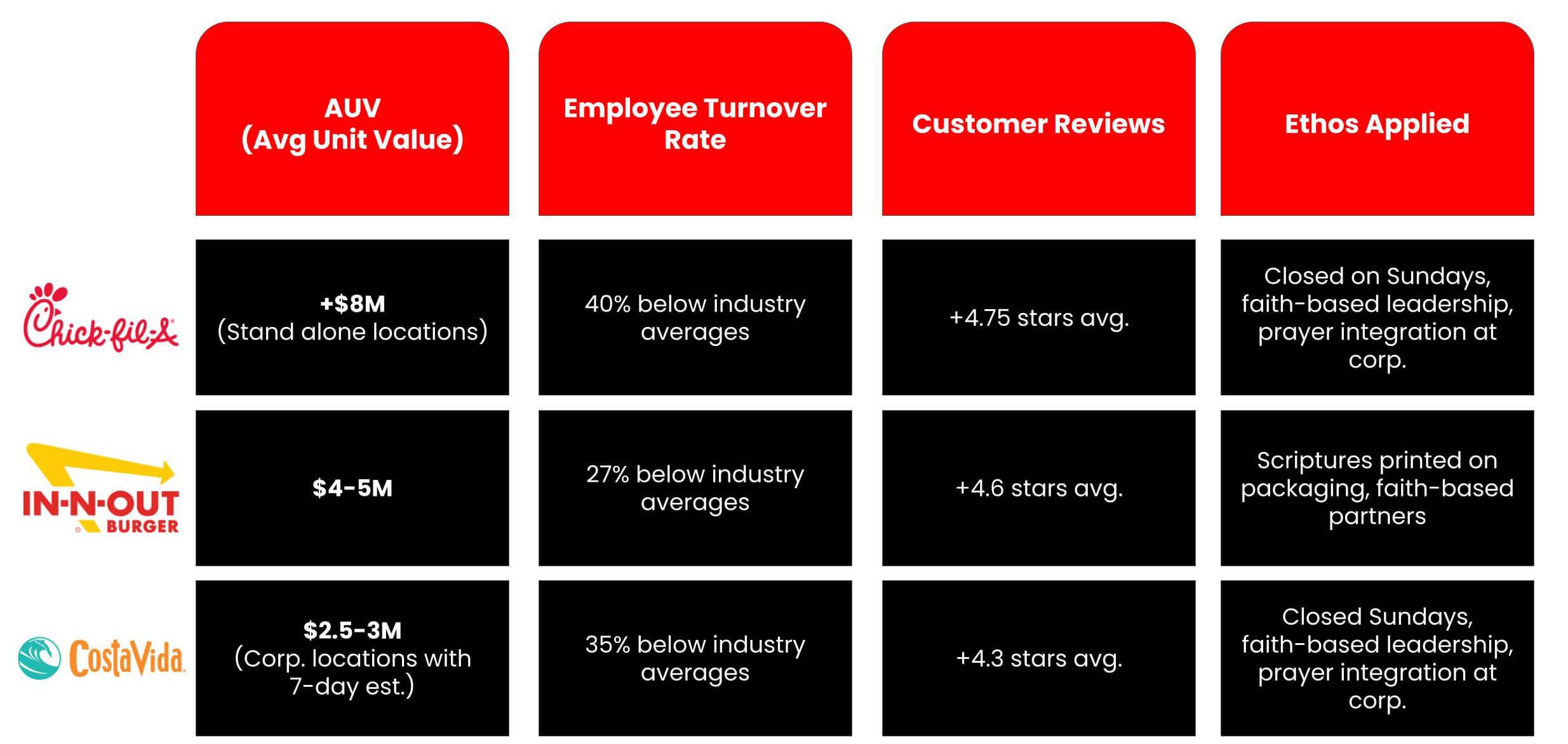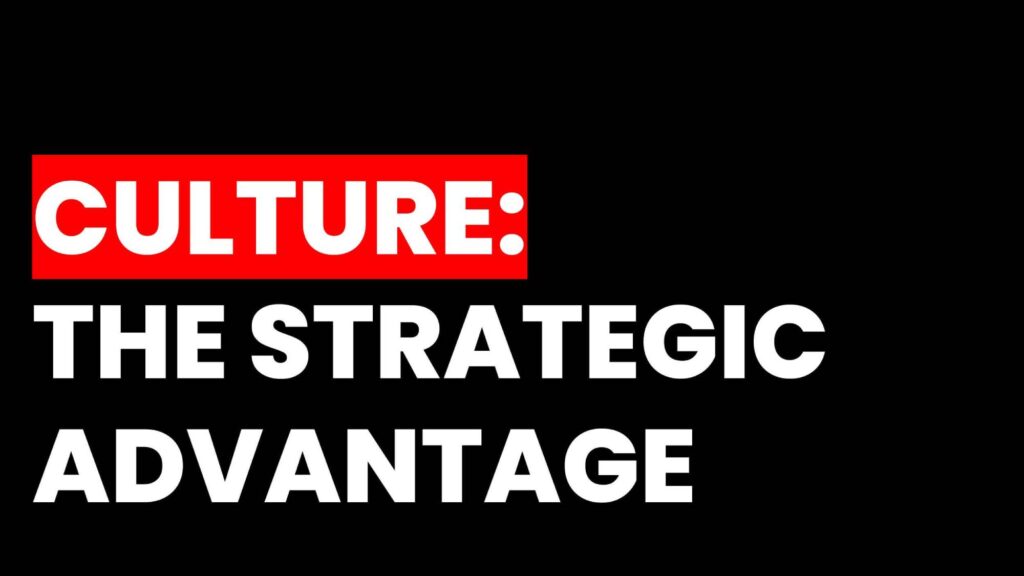Owning Your Ethos: Culture, Conviction and Business Performance
Author: Austin Wright, Head of Strategy & Analytics
In an age dominated by artificial intelligence, operational efficiency, and relentless competition, it’s tempting to believe that business success is purely mechanical. Stack the right tech. Optimize the process. Drive down costs. Provide great customer experiences. And yet—some of the most consistently high-performing restaurant brands in the U.S. are powered not just by systems and strategy, but by something deeper: conviction, even when it’s unpopular. Brands like Chick-fil-A, In-N-Out Burger, and Costa Vida have built operations that stand out not just for quality and customer experience—but for how unshakably they own their values. Values aren’t just marketing slogans. These are deeply rooted, often faith-informed cultures that drive real, measurable performance. These brands serve up burritos, burgers, and waffle fries with a side of ethos—and it’s working.
The Power of Owning Your Ethos
Ethos isn’t about perfection—it’s about clarity. It’s the soul of a brand, reflected in the way it hires, serves, grows, and responds under pressure. And in the case of these three restaurant chains, it’s tied directly to Christian values—faith in divine providence, stewardship, servant leadership, and treating people with dignity. This might not always be “popular” in the business world. Faith at work is still taboo in most boardrooms. However, these companies haven’t flinched. In fact, they’ve leaned into their identity, and the data shows the results.
“We’re not just in the chicken business. We’re in the people business.”
— S. Truett Cathy, Founder of Chick-fil-A
Three Brands, One Common Thread
Let’s take a closer look at the numbers behind the ethos:

They’re at the top of their categories in revenue per unit, customer satisfaction, and other metrics like employee turnover. So how do values drive numbers?
Culture Is Not a Soft Metric
These companies show that culture is not just a “nice to have.” It’s a measurable input with direct business outcomes:
- Employee Retention: When people feel like they’re part of a mission, they stay. Chick-fil-A turnover is dramatically lower than the QSR average.
- Customer Loyalty: People return to places where the experience feels consistent, respectful, and rooted in something real.
- Operational Excellence: These values often lead to cleaner stores, better-trained staff, and higher service consistency.
“We strive to do what’s right—because it’s right. That includes how we treat our team members and our customers.”
— Lynsi Snyder, Owner of In-N-Out Burger
Conviction Isn’t Always Popular—But It’s Always Powerful
The culture these brands promote isn’t designed for mass approval. In fact, at times it’s been controversial or countercultural. Chick-fil-A’s and Costa Vida’s stance on Sunday closures drew both praise and pushback. In-N-Out’s quiet faith messaging on packaging has sparked headlines. Yet, these companies didn’t flinch. They owned their ethos.
Not because it was trending.
Not because it was market-tested.
But because it was true to who they are.
In an era where brand identity often bends to cultural winds, standing firm has become a competitive advantage.
Conviction Over Conformity
What stands out most about these brands isn’t their menu innovation or advertising budgets—it’s their refusal to conform. In a world that rewards fast pivots and trend-chasing, they’ve stayed anchored. Chick-fil-A still starts corporate meetings with a prayer. In-N-Out still prints John 3:16 on the bottom of its cups. Costa Vida still promotes a very Christian purpose.
“We strive to be faithful stewards of God’s children by helping them have a positive impact on everyone they come in contact with.”
— David Rutter, Co-CEO, Costa Vida
Who are these brands?!? That countercultural clarity doesn’t limit them—it accelerates them. In fact, 2023 data from the Edelman Trust Barometer shows that 78% of consumers say they are more loyal to brands that stand for something bigger than profit.
What Business Leaders Can Learn
Whether you’re leading a fast-casual concept, a tech startup, or a service business, the lessons are clear: Own Your Identity. Whether it’s faith-based or mission-driven, clarity creates alignment. Culture drives ROI. Retention, satisfaction, and word-of-mouth start with how people feel inside your business. Conviction truly wins in the long game. Trends come and go, but authenticity scales. The future isn’t just about who has the best tech or fastest delivery. It’s about who knows who they are—and refuses to compromise. Ethos is a growth strategy, and these three brands remind us that businesses can grow not in spite of their values, but because of them. They believe in divine providence. They embed principles of service and purpose. They promote from within, invest in people, and lead with humility. And they are thriving.
The takeaway? Owning your ethos is not just admirable—it’s strategic. To be crystal clear, the message here isn’t that every business should adopt Christian values. It’s that clarity and conviction—especially when it’s not the easy path—can drive uncommon results. True, our world changes, and there may come times when the way a brand’s ethos is applied—as it relates to messaging, partnerships, or similar areas—may need adjustment, but at the bedrock of an ethos, the principles need to stay solid. In a world of safe branding and sanitized values, the boldness to own your ethos is not just admirable. It’s rare. And that rarity stands out in the market.
Turn Conviction Into Conversion
Want to explore how owning your values can drive performance? Connect with Austin Wright at austin.wright@tandemtheory.com or reach us at hello@tandemtheory.com.
Common Questions:
1. What is values-based branding and why does it matter?
Values-based branding is a strategy where companies define and commit to core beliefs that shape every customer interaction, decision, and message. It matters because modern consumers want to support brands that reflect their values. As seen with Chick-fil-A, In-N-Out Burger, and Costa Vida, standing firm in brand ethos fosters loyalty and high performance—even in competitive categories.
2. Which brands are known for purpose-driven marketing?
Many top-performing brands embrace purpose-driven marketing to differentiate themselves. For example, Patagonia champions environmental stewardship, Ben & Jerry’s leads with social justice, and TOMS built a model on giving. In the restaurant space, brands like Chick-fil-A, In-N-Out Burger, and Costa Vida showcase how unwavering values can define culture, attract talent, and build trust.
3. What consumer behavior trends in 2025 support purpose-driven marketing?
According to the 2025 Edelman Trust Barometer, 78% of consumers say they are more loyal to brands that “stand for something bigger than just making money.” A recent NielsenIQ study also found that over 70% of Gen Z and Millennials are more likely to buy from brands that reflect their social or environmental values. These trends signal a major shift toward purpose-led purchasing behavior.
4. How does purpose-driven marketing influence brand loyalty?
Purpose-driven marketing builds deeper emotional connections with consumers by aligning brand actions with clearly communicated values. This consistency creates trust, which directly impacts customer retention, referral behavior, and long-term brand advocacy. As the article demonstrates, brands that embody their purpose throughout the organization often see greater loyalty and operational strength.
